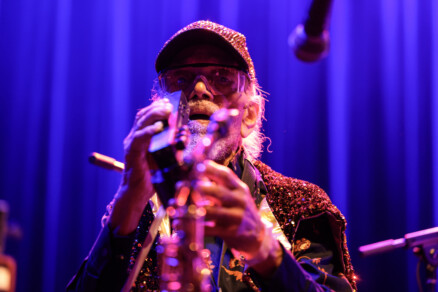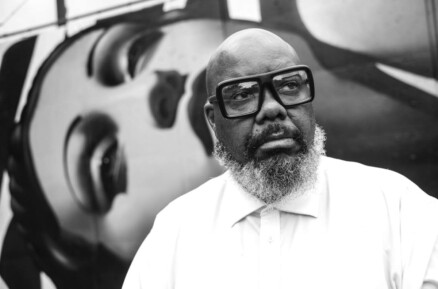The Sun Ra Arkestra blasts off at the Howard
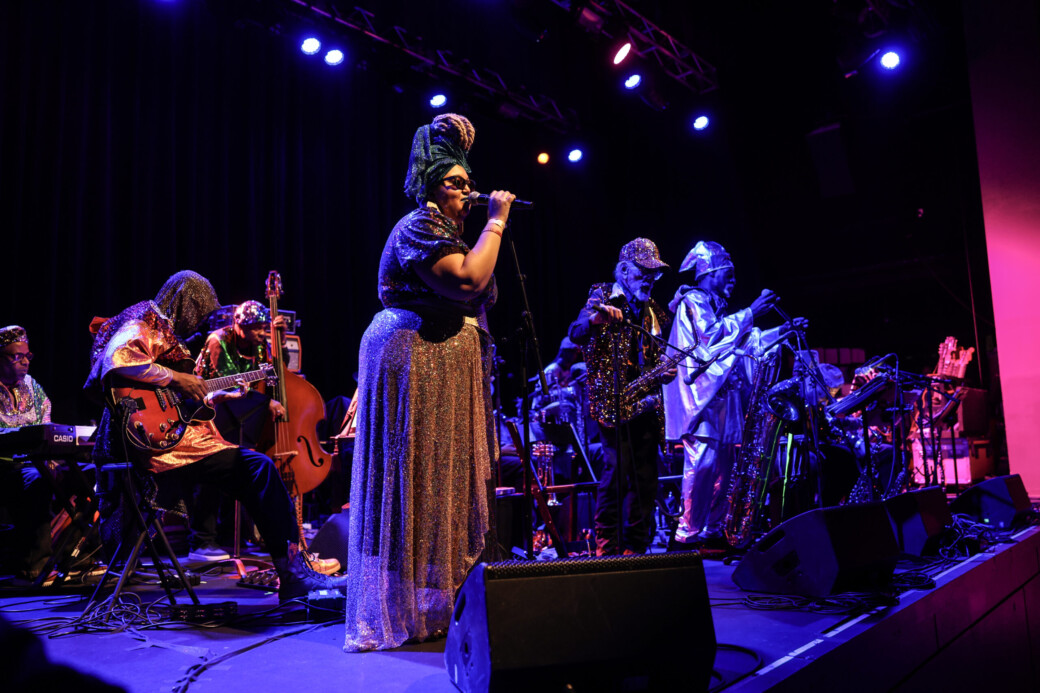
Sun Ra Arkestra
Howard Theatre
Saturday, March 22, 2025
On the first Saturday night this spring, I visited the Howard Theatre to hear the Sun Ra Arkestra under the direction of Marshall Allen on a double-bill with indie-rock pioneers Yo La Tengo. The Howard has been at the corner of T Street and Florida Avenue for 115 years. When it opened, it was billed as “the largest colored theatre in the world.” For many years, it was as important a venue for presenting the best in Black American talent as Harlem’s Apollo — but the Howard was first. Duke Ellington played there. So did Ella Fitzgerald, Billie Holiday, Louis Armstrong and Cab Calloway.
On March 22, the hall was veritably mobbed with a standing-room-only, largely 30- and 40-something audience out to support the headliners. The Arkestra ceremonially opened our intergalactic odyssey with a down-tempo rendition of “Space Is the Place.” Tara Middleton’s piercing yet mellifluous voice was a settling blanket over a large and restless crowd. She brought the decorous anthem to a close with a recitation of the space chant: “We’ll wait for you.” Sun Ra sang that line in the first person, and there’s ample evidence that three decades after leaving the planet, he has indeed been waiting. His example and inspiration, even his credo of disciplined creativity, have been waiting.
Alto saxophonist Marshall Allen joined Ra’s first Arkestra in 1958. When he inherited the helm in 1995, after Ra’s earthly departure, Marshall rebuilt Ra’s mothership-qua-big band, wrapping a crew of gifted young players around a core of veteran virtuosi. This new Arkestra is the most central, most authentic emissary of a 21st-century Ra revival that has seen his cultural and musical ideas broadly co-opted as an imprimatur of radical creativity. Sun Ra’s principle methodology – what he called precision-discipline – was an applied dialectic of Black excellence through grueling repetition.
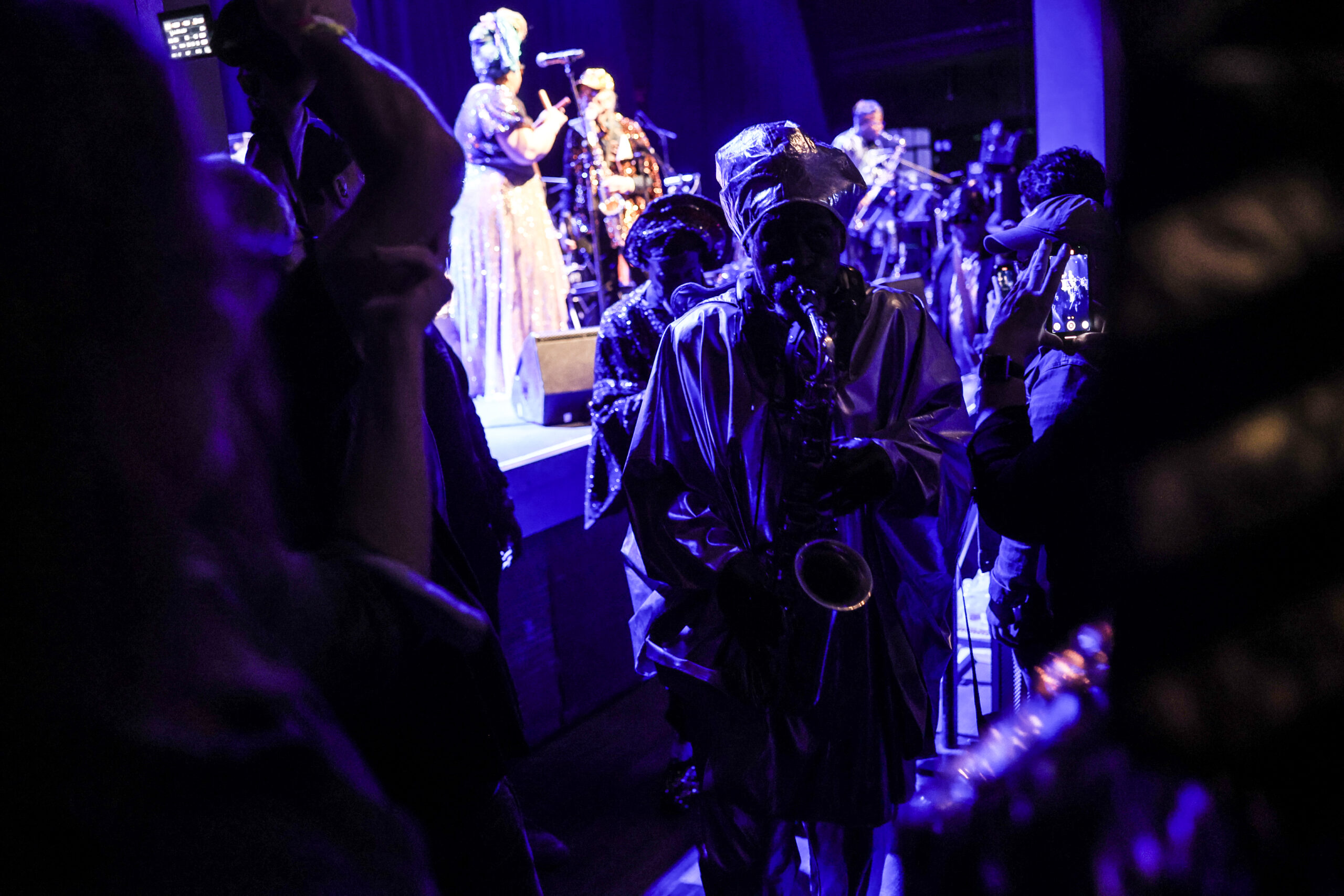
That evening, there was an overarching sense that the stage held a depth of musical experience and knowledge that doesn’t often show up at this venue — or most anywhere.
After the “Space is is the Place/We’ll Wait for You” medley, the ensemble launched into “Holiday for Strings,” a 1955 composition by David Rose that served as the theme song for at least one ancient televised variety show. It was recorded by Sun Ra and his Astro-Infinity Arkestra for the 1960 album Holiday for Soul Dance, where it can be heard as an early example of Ra’s singular pianistic vision. The Arkestra’s latest album, Lights on a Satellite, released last November, features a version of this tune with lyrics added by Arkestra trumpeter Michael Ray. At the Howard, the band stretched out into the evolving melodic interplay that is the essence of their interpretation, while Marshall Allen – who will celebrate his 101st birthday in May – added a harmonic crosscurrent with his trademark saxophonic voice, splitting the difference between purring and wailing.
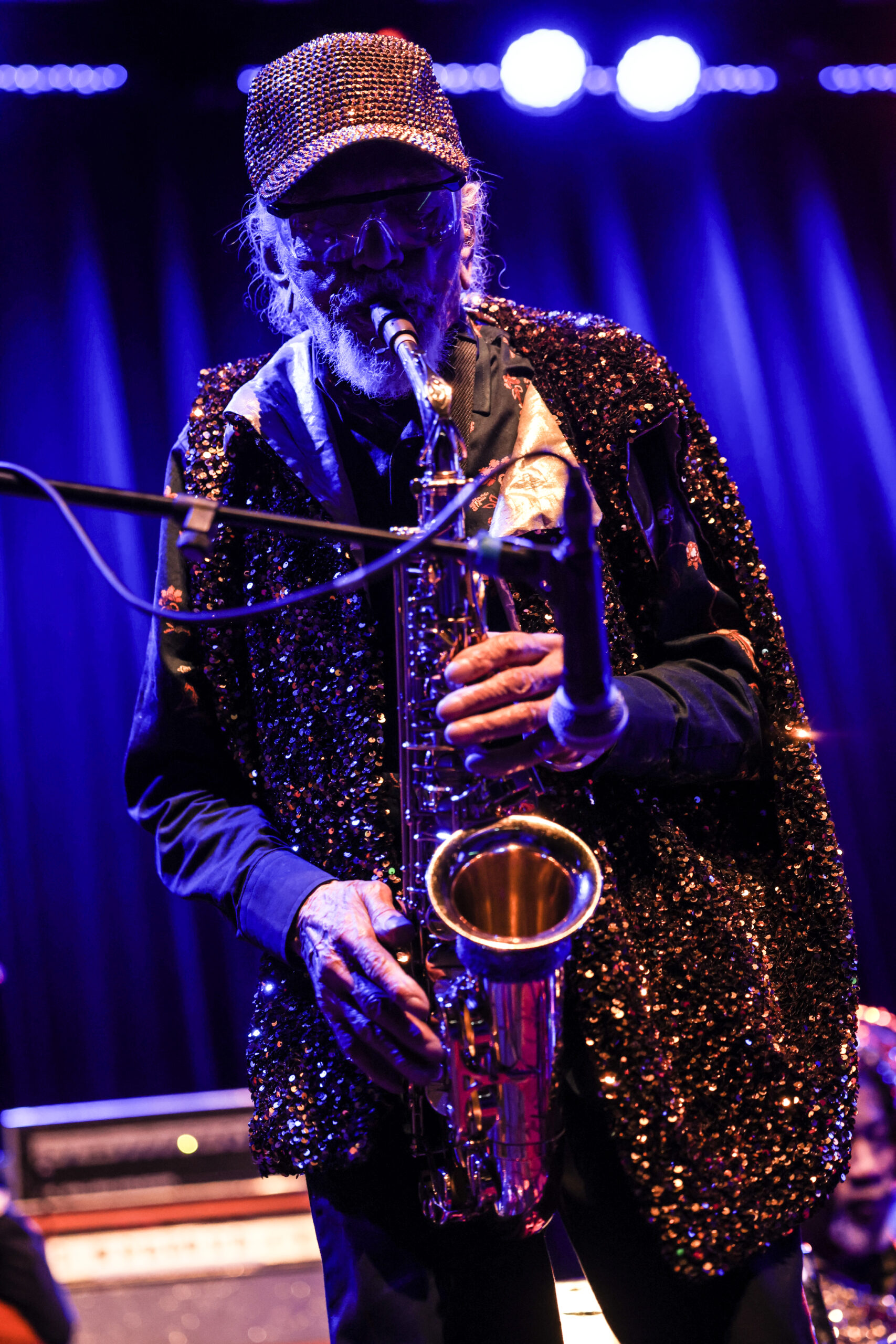
As Allen has softened into the fullness of a century of earth-walking, fellow saxophonist Knoel Scott has taken on more of the responsibilities of onstage traffic director and audience liaison. Scott, who joined the band in 1979, spoke with me by Zoom after the show. He described his role as “the conductor — a conduit for the spirit of Ra.” Scott and drummer George Gray are both from Baltimore, and it was Gray’s idea to invite Lafayette Gilchrist — the D.C.-born, Baltimore-based pianist — to sit in with the band that night. Needless to say, Gilchrist’s inside-out knowledge of what Matt Shipp has called the Black Mystery School of Pianists, grounded the ensemble’s performance around the instrument that has always been at the center of the Arkestra’s music.
Like much of the New Arkestra’s repertoire, “Somebody Else’s Idea” has been rearranged for contemporary listeners and players. In our conversation, Scott equated the song’s lyric, delivered beautifully at the Howard by Middleton, with the essence of Sun Ra’s message: “Somebody else’s idea of somebody else’s world is not my idea of things as they are. Somebody else’s idea of things to come may not be the only way to vision the future.” Their performance of this solar standard exposed just how rhythmically complex and insistent this music could be. Brazilian percussionists Elson Nascimento and Jorge Da Silva are always in the Arkestra mix, but here their work — augmented by Gray on kit and Scott on djembe — provided the axis for a densely hypnotic, polyrhythmic excursion that rivaled the kinds of higher-order grooves for which Fela Kuti was known.
Scott brought the ensemble out of this simmering number with a nod to his mentor, Allen, and he asked the audience to turn toward Chicago’s storied legacy as a musical mecca. His mention of the Windy City cued bass player Tyler Mitchell to dig into an extended solo. With the house lights bathing him in red, the Chicago-born Mitchell took his time building a nostalgic aura that reflected back on young Sonny Blount’s early years playing for mob-run strip clubs in the city’s far suburbs. After milking the moment, the lights changed from soaking red to strobing blue, and the band’s horn section picked up the head of “Blue Set,” a Sun Ra composition originally released as a 45-rpm single in 1959 and subsequently reprised as a hard-swinging high point in many Sun Ra performances. Then, with the license they have claimed to restructure the Sun Ra songbook, the Arkestra’s voices led their audience in a call-and-response session of “We Travel the Spaceways,” dropped right on top of the blues.
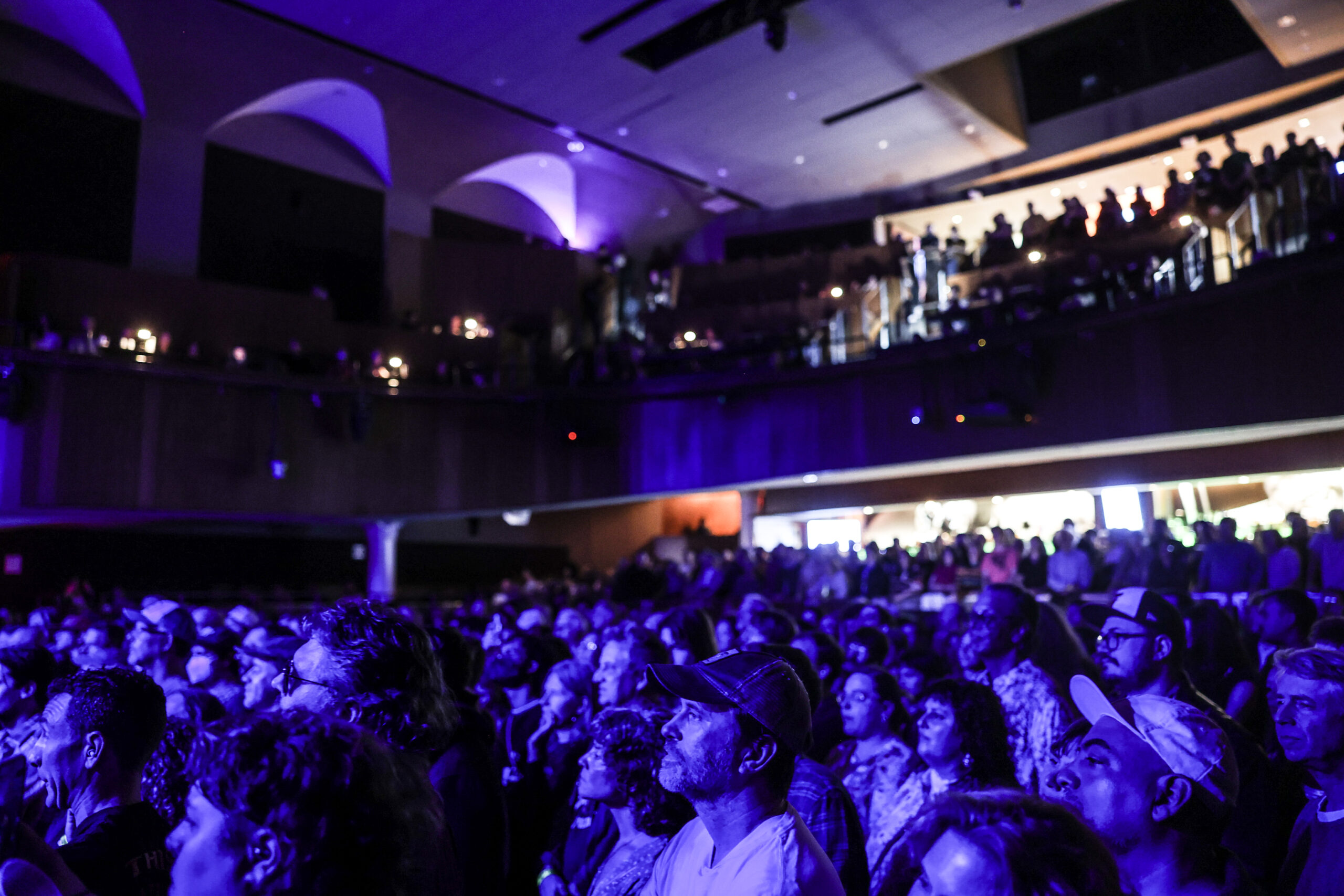
I was too far away from the stage to accurately credit the many brilliant solos (in addition to Allen’s) that adorned a flawless set. But Scott brought me up to date on the brass and woodwind personnel: Chris Hemingway and David Lee Jones played alto saxophones. James Stewart and Scott were heard on tenor. Anthony Nelson was on baritone. Cecil Brooks and Michael Ray played trumpet. Rober Stringer and Dave Davis played trombone.
“Blue Set/We Travel the Spaceways” dissolved into the title selection from Lights on a Satellite. I could sense that the 45 minutes allocated for the opening act were almost over, and I was feeling a little bad about it, but then, as if reading my mind and offering a special gift ahead of its departure, the Sun Ra Arkestra closed out with a few precious bars from one of my personal favorites: “Fate in a Pleasant Mood.” As I bid my good-byes to Marshall and the band, I bumped into guitarist David Middleton in the stairwell. He and Tara’s wonderful daughter peeked around her father’s legs as we caught up, mostly on current events. Alter destiny.

